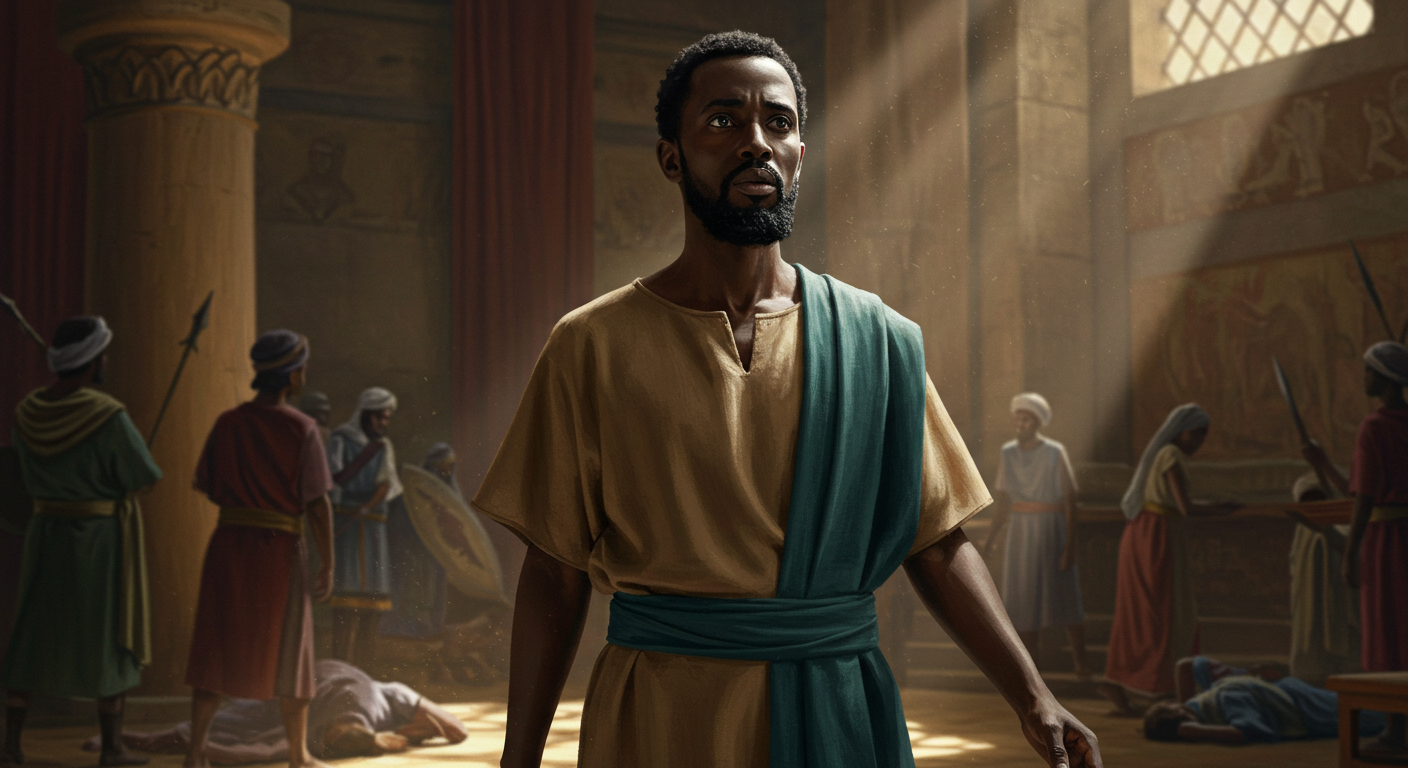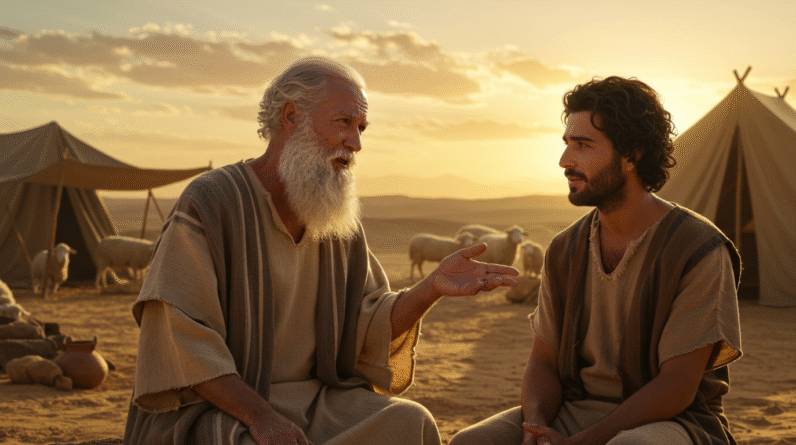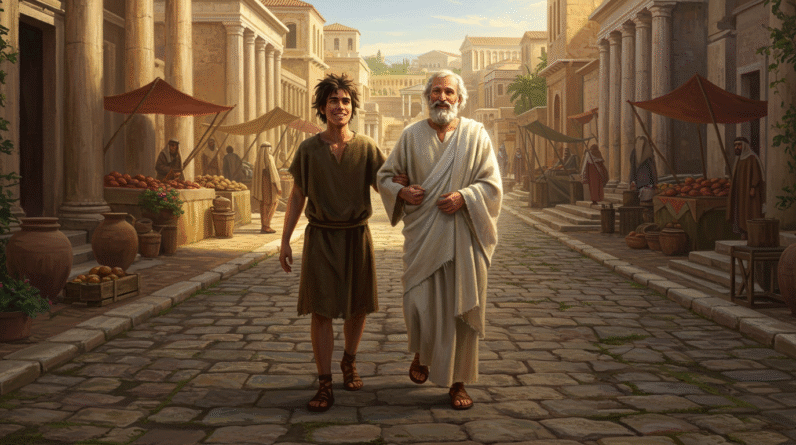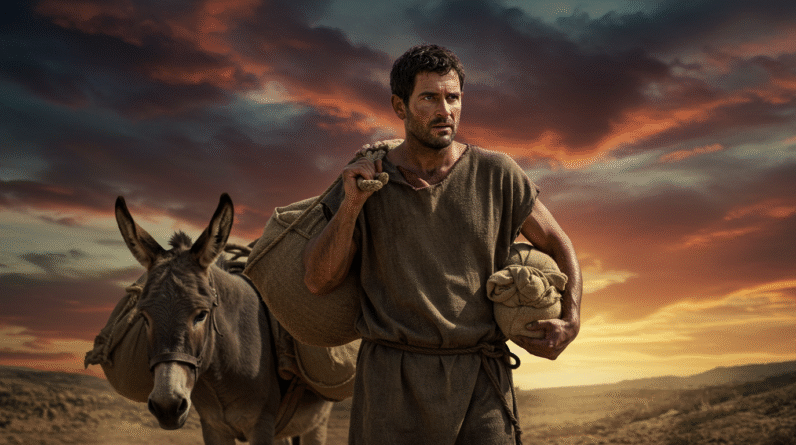Explore Ebed-Melech’s bold stand in Jeremiah’s story, a testament to courage and justice. Discover how one voice can drive change amidst adversity.

Introduction
Understanding the courage of historical figures can offer profound insights into our lives today. Ebed-Melech, a relatively unsung hero within the biblical narrative, holds a special place for his valor and compassion. His story enveloped within the broader narrative of Jeremiah, is significant for its demonstration of courage and morality under pressure. Ebed-Melech’s actions provide a poignant reminder of bravery and righteousness within the harrowing events described in the Book of Jeremiah. His story is one of standing up for justice in a time when silence would have been the easier path.
Context in the Bible
Ebed-Melech’s story unfolds during a tumultuous period in Judah’s history, marked by political intrigue and social instability. He appears within the larger narrative centered on the prophet Jeremiah’s struggles. Ebed-Melech, an Ethiopian eunuch serving in King Zedekiah’s court, finds Jeremiah at the bottom of a cistern. Despite being an outsider in many respects—by nationality and status—Ebed-Melech’s actions serve as a beacon of moral courage.
Their Story in the Bible
The story of Ebed-Melech begins as Jeremiah finds himself in dire circumstances. The prophet had been proclaiming a message of doom to Judah, warning of the impending Babylonian invasion due to the people’s unfaithfulness. His prophecies earned him the disdain of religious and political leaders, leading to his imprisonment. Eventually, Jeremiah is cast into a muddy cistern, and left to die. It is here that Ebed-Melech enters the narrative.
Recognizing the injustice of Jeremiah’s plight, Ebed-Melech takes a perilous step. He approaches King Zedekiah, advocating for Jeremiah’s release. This was not an easy decision; it required immense courage to speak out against the actions endorsed by powerful officials (Jeremiah 38:7-13). Yet Ebed-Melech’s fearless advocacy highlights his compassion and sense of justice. His plea to the king succeeds, and with the king’s consent, he orchestrates a rescue, pulling Jeremiah out of the cistern with a team of men.
The courage demonstrated by Ebed-Melech was morally substantial. As a foreigner and a eunuch, his voice was likely considered less important in the court. Nevertheless, his unwavering commitment to righteousness over self-preservation sets him apart. His bravery not only saved Jeremiah’s life but also served as a testament to the power of one individual’s conscience-driven actions amidst unjust systems.

Lessons from Their Life
Ebed-Melech’s life, though briefly mentioned, offers profound lessons about courage, justice, and empathy. These lessons stand as a reminder for us, offering practical applications in our daily lives.
Courage to Stand for Justice
Perhaps the most evident lesson from Ebed-Melech is the bravery required to stand up for justice. In a world where silence might seem safer, Ebed-Melech chose to raise his voice for the right cause. This highlights that true courage often involves putting oneself at risk for the sake of justice. His actions encourage us to confront injustices within our environments, regardless of potential personal detriment.
Compassionate Advocacy
Ebed-Melech’s story is also one of compassionate advocacy. It demonstrates the profound impact that empathy can have, even within hostile environments. He saw Jeremiah not just as a political prisoner but as a human being in desperate need of help. This act of compassion challenges us to look beyond societal divisions and advocate for those in need, irrespective of their status or background.
Influence of One
Ebed-Melech’s narrative underscores the power of a single individual’s actions. Despite his marginal position in society, he leveraged his place in the king’s court effectively. His story teaches that we all possess the capability to incite change, regardless of our perceived societal standing. Our actions and voices hold the potential to affect positive change around us, much like Ebed-Melech influenced the course of events in Jeremiah’s life.
Connection to Today’s World
Ebed-Melech’s courage offers unique insights applicable to modern life. In a world often characterized by ethical dilemmas and social injustice, his story offers both guidance and inspiration.
Modern-Day Advocates
In contemporary times, advocacy remains an essential yet challenging endeavor. Ebed-Melech’s actions can inspire us to stand against injustice, echoing the valor needed today as we address issues of inequality and discrimination. His story encourages us not to underestimate the value of our voices, no matter how insignificant they may appear.
Empathy Against Division
Our current world often emphasizes division—whether through politics, race, or economic disparity. Ebed-Melech transcended such divisions with his compassion for Jeremiah. His empathy is a gentle reminder that understanding and aid can bridge differences, prompting us to build connections in an increasingly fragmented world.
Personal Responsibility
The story of Ebed-Melech also highlights the critical role of personal responsibility in addressing societal wrongs. Much like Ebed-Melech, each of us has a role to play within our communities. Whether that means challenging the status quo or offering a lifeline to those in need, his story steers us toward personal accountability in cultivating a just society.
Key Bible Verse
The defining verse that encapsulates Ebed-Melech’s journey is found in the book of Jeremiah:
“But Ebed-Melech, a Cushite, an official in the royal palace, heard that they had put Jeremiah into the cistern.” (Jeremiah 38:7)
This verse marks the pivotal moment of Ebed-Melech’s empathy in action. His response to this situation exemplifies how awareness and moral contemplation spur meaningful actions, illustrating the power of listening and being attentive to the suffering around us.
Thought-Provoking Question
Ebed-Melech’s decisive moment calls us to reflect: When faced with injustice, do you have the courage to act, even if it means standing alone against the tide? How can you leverage your position—whatever it might be—to advocate for what is right?







